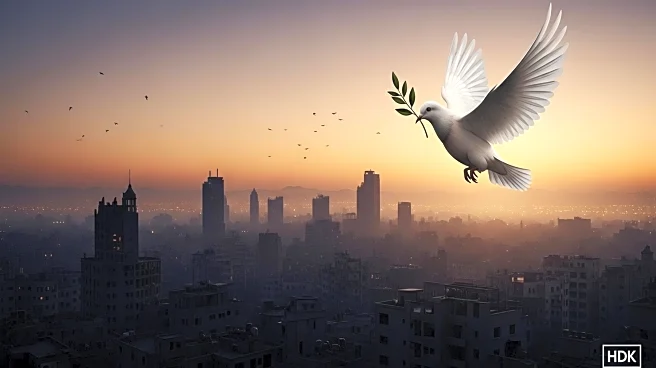What's Happening?
Following a ceasefire in Gaza, discussions are underway regarding the future governance and reconstruction of the region. Ghaith al-Omari, a senior fellow at the Washington Institute for Near East Policy, expressed optimism about the ceasefire holding, citing a lack of appetite for renewed conflict among Israelis, Palestinians, and regional stakeholders. The Trump administration has brokered a plan for an interim governing body, involving a committee of Palestinians and technocrats led by President Trump and former British Prime Minister Tony Blair. However, uncertainties remain about the composition and powers of this body, as well as the role of the Palestinian Authority, which has been weakened by internal and external challenges.
Why It's Important?
The ceasefire and subsequent governance plans are pivotal for stabilizing Gaza and preventing further conflict. The involvement of international figures like President Trump and Tony Blair underscores the global significance of the issue. Successful governance and reconstruction could lead to improved living conditions and political stability in Gaza, benefiting both Palestinians and Israelis. However, the weakened state of the Palestinian Authority poses challenges, as effective governance requires reform and cooperation from various stakeholders, including Israel and neighboring Arab countries. The situation in Gaza has broader implications for regional peace and security, making the outcome of these discussions critical.
What's Next?
The next steps involve clarifying the roles and powers of the proposed interim governing body and addressing the need for Palestinian Authority reforms. Arab countries, such as Saudi Arabia and the UAE, may play a significant role in influencing these developments through political and financial support. The success of the governance plan depends on cooperation from all parties, including Israel, which has historically undermined the Palestinian Authority. The international community will likely continue to monitor the situation closely, with potential adjustments to the plan based on evolving dynamics in the region.
Beyond the Headlines
The ceasefire and governance discussions in Gaza highlight deeper issues of political legitimacy and reform within the Palestinian Authority. The need for new leadership and structural changes is evident, as public opinion has largely discredited current leaders. The involvement of Arab countries in reform efforts could introduce culturally appropriate governance models, potentially transforming the political landscape in Gaza. Additionally, the role of international diplomacy, particularly by the Trump administration, may influence future peace negotiations and regional alliances.











